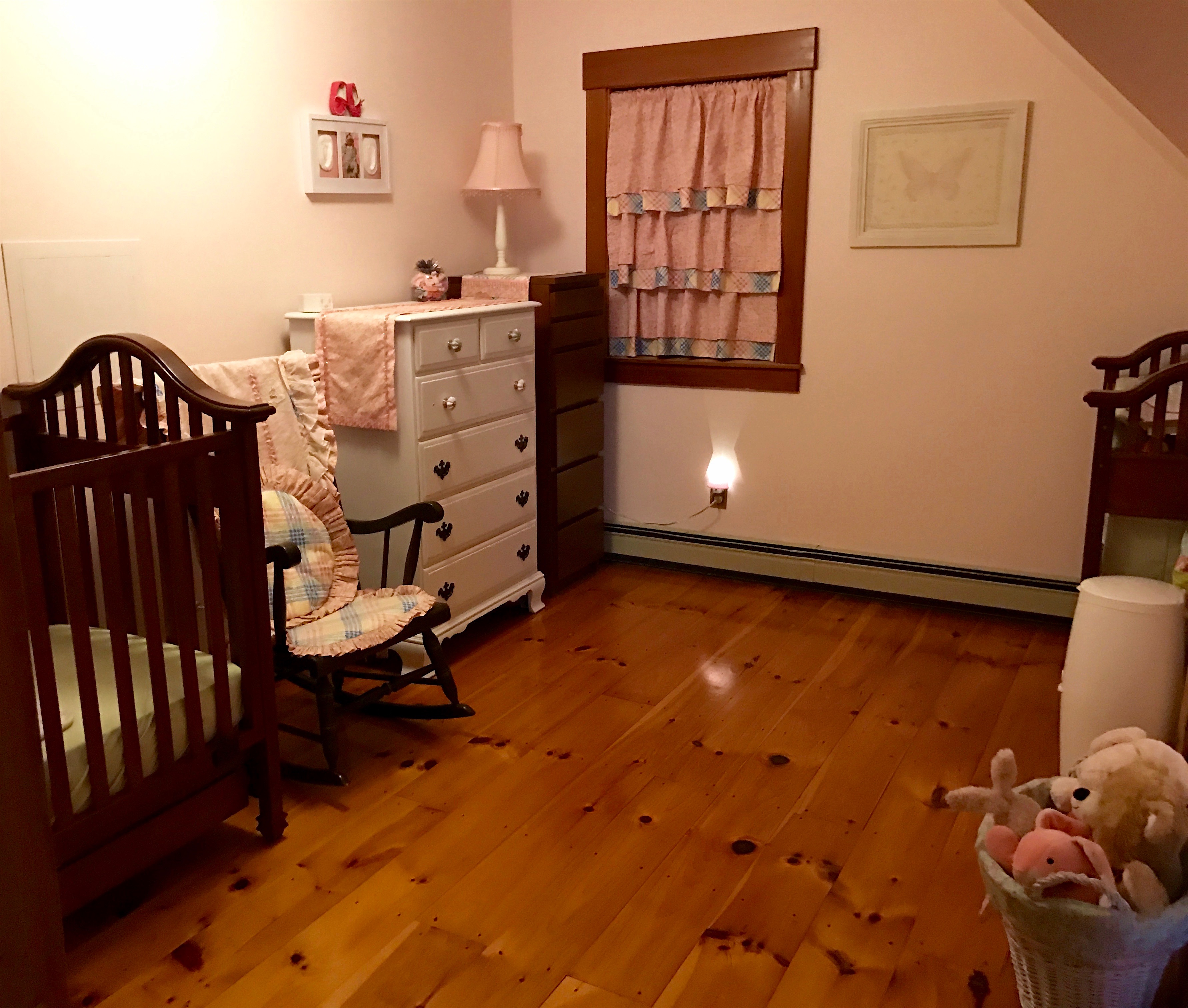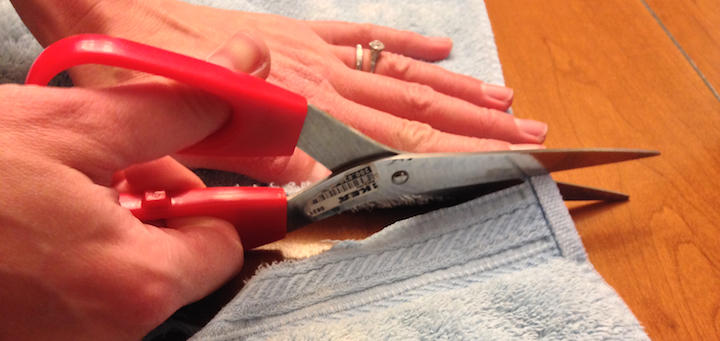
People love to ask me about saving money with kids and lucky for these people, I LOVE talking about saving money with kids! There’s just one teensy, tiny problem: my kids are young. Super young. As in, one of them can’t even crawl yet…
So while I have a broad base of ideas to share on saving money with infants, babies, and toddlers, that’s pretty much where I max out on my personal experience. For handy dandy reference, here are just a few of the posts I’ve written on this absorbing topic:
- Fighting Back Against The Baby Industrial Complex
- The Gear You Actually Need For Your Baby (Or The Next Baby Shower You Attend)
- How I Make My Own Baby Food and Other Frugal Parenting Tales
- How To Fly With A Baby. On An Airplane. By Yourself.
- Our Thrifty And Simple Baby’s First Birthday Party
- How I Remain Frugal While Pregnant (!!!)
Sure, I could extrapolate and make stuff up about saving money with older kids, but in my experience, giving advice on stuff you haven’t done yourself is–uh–not a great idea. And why make stuff up when I have a braintrust of experts at my fingertips?! I know that Reader Suggestions are supposed to be about what you (the readers) want to learn about, but I’ll be honest here, Reader Suggestions are also themed around what I (yes, me, me, me) want to learn about! Because the older I get, the more I realize the less I know. Let me try that again: As I age, I realize I have more known unknowns and unknown unknowns. In short: there’s a lot I don’t know, but that other people do know. Ok, let’s get out of this linguistic loop and talk about our kids…
This actually IS a topic that a lot of you are interested in because you’ve been emailing, messaging, commenting, asking me in person when you bump into me (this happens more often than you’d think and I’m always doing something dumb at the time like buying a cupcake… ) all to ask me the pressing query:
How do you save money and embrace frugality with tweens and teenagers??? And teach them to be responsible with their money too???
In response I’m always like, “Uh, um, good question! I have no clue! Would you like to share this cupcake that I definitely do not need to be buying and/or eating?”

Additionally, when I polled our Frugalwoods Facebook group a few months back for your suggestions of Reader Suggestions topics, quite a few of you begged me to cover the topic of older kids + money. So today, we’ll do just that!
This is really a two-part question:
- Teens are expensive, how do I save money while raising them?
- How do I teach my teen about responsible money management?
I think that #2 begets an answer to #1 because when kids understand the mechanics of money–and the values-based decisions your family makes about money–it opens up the opportunity for them to feel enfranchised to save more and become a participating member in the family budget.
Welcome to my monthly Reader Suggestions feature! Every month I post a question to our Frugalwoods Facebook group and share the best responses here. The questions are topics I’ve received multiple queries on and my hope is that by leveraging the braintrust of Frugalwoods nation, you’ll find helpful advice and insight. Join the Frugalwoods Facebook group to participate in next month’s Reader Suggestions!
Saving Money With Bebes + Toddlers
You didn’t think I’d skip to your good advice that quickly did you? Hah! I have to be longwinded earn my keep around here somehow. So I’ll share the only advice I do have, which is narrowly focused on how my husband and I save money with our two daughters, who are aged almost three years old and seven months old (as I said, super young). As I look back over our monthly spending for the past four years (easy to do since I share it here on the blog every month), I’m sort of shocked at how little we’ve spent on our kids. I’m fairly certain that our beloved dog (who sadly passed away earlier this year) cost us more during her lifetime (and she was worth every penny). The #1 way we’ve spent so little on our little bundles of spit joy is by:
Tactic #1: Source Everything Used

I cannot possible encourage this approach strongly enough. Babies need a bunch-o-stuff and buying it all new would make a considerable dent in anyone’s budget. But here’s the wonderfully delicious hidden secret of baby stuff: babies outgrow it in a hot, hot minute and then people want that crap lovely stuff out of their house.
To whit, Littlewoods is a mere seven months old and has already outgrown all of the following:
- Bassinet
- Bumbo seat (don’t laugh, my kids freaking loved this thing)
- Infant swing AND infant rocking seat
- Infant bathtub
- Three sizes of clothing: newborn, 0-3 months, and 3-6 months
- Floor playmat
If we’d bought all of this stuff new, I think we’d be out several hundred (if not a thousand) bucks on stuff a baby uses for only six months (or less!). Even with two (or more) children, that’s still a horrible return on investment. However, I’m now donating all of the above items to anyone who needs them. Sidenote to local friends: they’re yours if you want them, except for the Bumbo seat, which is already spoken for (I told you that thing is popular) and the infant swing and bassinet, which are already happily living with new families. I’m happy to give all of these things away for free because I GOT THEM ALL FOR FREE (or very cheap). All are used and all are a bit old, but they all work perfectly fine and will cycle through who knows how many more infants before they’re completely done with life on this earth.
And this volume of stuff and this cycle of receiving for free and giving away for free will continue with clothing, gear, toys, and books for the foreseeable future of my children’s lives!
I have a complete guide on how to find free (and cheap) used things which is called: How To Find Anything and Everything Used: A Compendium Of Frugal Treasure Hunting. And don’t you tell me that used stuff is disgusting, because I have a complete refutation of that right here: The Myth Of The Gross Used Things. Clearly I feel strongly about this because I actually have YET ANOTHER post specifically devoted to bebes and their stuff: Fighting Back Against The Baby Industrial Complex.
I’ll give you the TLDR version on how to source EVERYTHING used:
- Join (or create) your local Buy Nothing Group
- Join (or create) your local Parents’/Neighborhood/Town group/listserve/Facebook page
- Join (or create) your local Parents’ Buy/Sell/Trade group (usually through either email or Facebook)
- Frequent kids’ clothing/gear swaps and exchanges
- Visit thrift stores
- Shop at garage sales!
- Pick up free stuff off the side of the road (here’s my guide on how)
- Cruise Craigslist (although to be honest, I don’t find the prices on kids’ stuff to be all that great. I feel like it’s usually too expensive. But you never know!)
- Talk to your friends and neighbors who have kids and swap/share/trade items around. I currently have maternity clothes that keep cycling between a few of us as we go through multiple pregnancies (and these clothes were USED to begin with!!!). Which reminds me… who wants the maternity clothes next? I need them out of my basement!!! (although I’m keeping the comfy maternity yoga pants for now… )
- If you’re not sure where to start with getting plugged into “all things baby” in your area, begin with your local public library. They are HIGHLY likely to have some sort of (free!) baby playtime/story hour/sing-a-long for parents and babies where you can meet fellow parents (and babies!) and get integrated into the community.

I’ve successfully utilized variations of the above in both uber urban Cambridge, MA and uber rural Vermont, so I’d be hard pressed to imagine a city where some combination of the above wouldn’t work. And my uber frugal sister does the same in rural San Diego county, so there’s a coast to coast reference for ya.
I don’t get all of my hand-me-downs from friends or family and I also don’t get all of them for free. I’ve been known to spend upwards of $0.25 cents at a garage sale in order to get what I need for my kids. Hey, nothing’s too good for my babies. If you’re wondering where garage sale purchases are in our monthly expense reports, I lump them into the “household supplies” category. I have grand plans to itemize my garage sale (cash) purchases, but this just hasn’t happened yet… Now if I could use a credit card at garage sales, then we’d be in bizzness.
Tactic #2: Let Go Of Perfection
This is primarily a supporting tactic for tactic #1 because inherent in taking all used things is the mandate to let go of perfection. I am not, to be honest, super jazzed about the style or color of a lot of my baby stuff. It’s not what I would select if I were to go on a wild shopping spree of buying everything new. A lot of my kids’ clothing is not strictly my style (we have WAY more pink that I’d prefer) and there are quite a few stains and holes for us to contend with. But I also do not care. My children don’t care at this point in their lives, so why should I care? I fully realize there will likely come a day when they DO care, which is precisely why we’re tackling the topic we are in today’s post!!!

But at this point? It doesn’t matter that Babywoods is wearing jeans with a hole in the knee to preschool today (since it’s likely she’ll come home with even more holes/definitely a paint stain). And it doesn’t matter that Littlewoods is napping in a crib whose color is not my absolutely fave. These are fleeting, ephemeral times of my children rapidly outgrowing both cribs and jeans and it simply does not matter. My children are always clean (mostly… ), safe, fed, happy (mostly… ), and properly dressed for the weather. Beyond that? Who cares! I certainly don’t.
This is also an element of saving money in areas that don’t ultimately matter in order to spend in areas that do matter. While I find crib color to be an unimportant element of my children’s upbringing, I can imagine that later on, I’ll decide piano lessons or soccer are, in fact, pretty important. By saving in areas that don’t matter, I’m giving my future self the freedom to spend.
When you can embrace and enshrine a mentality that perfection is unimportant and when you can become ok with stuff that’s not your taste/style/preference, you will spend dramatically less money. And as you might’ve guessed, that approach holds true in all areas of life, not just with children. The less you demand your stuff to be perfect, the less you’ll spend. The less you require your material possessions to serve as embodiments of joy or as stand-ins for human emotions, the less you’ll spend.
In truth, this approach is a lot easier for me now that I’m being treated for postpartum depression. Through medication and therapy, I’ve been able to divest myself of this drive for perfection to a higher degree than I ever could before. And that is a wonderful thing for me!
Tactic #3: Start Early And Make It A Family Value

We instill all sorts of values, ethos, and concepts in our kids starting at a young age, so why not instill your financial values too? That’s what we’re doing with our kiddos and we treat money conversations with our three-year-old (ok, ALMOST three-year old) in the same way that we do all other aspects of life. Money is not a hidden or taboo subject and we work to integrate age and stage-appropriate financial lessons for our daughters.
We’re obviously not delving into the nuances of frugality or the complexities of compound interest yet, but we are integrating conversations about money into our daily lives because money is a part of our daily lives! Babywoods understands that you use money to buy things and that there’s a finite amount of money and a finite amount of stuff that we need.
We’ve taught her that we only buy what we need and that we shop from a list (most of our shopping is at the grocery store, so this is our most frequently cited example. Plus, she loves food so it’s a ready topic at all times for her). Babywoods will often ask about any given item: “Did we grow this in our garden? Did daddy buy it at the grocery store? Or is it a hand-me-down?” She gets the concept that these are three of the primary ways that things come into our home. Every time I receive a bag of hand-me-down clothing for the girls (most recently from a lovely Frugalwoods reader who generously mailed me her daughter’s old clothing, which is gorgeous!!!! And before that from our wonderful local friend whose two girls are in elementary school and who has impeccable taste! Thank you!!!!), I show the clothes to Babywoods and explain that someone outgrew them and doesn’t need them anymore and kindly gave them to us.

We discuss why we don’t need to buy new things and then we transition into a conversation about how we donate the things we don’t need anymore. I did recently catch her trying to “donate” her sister’s toys as she deemed them “no longer needed,” so we’re still ironing out the details there, but she’s getting the idea. Another easy concept for her to grasp is how fortunate we are–we often discuss how lucky we are to have a warm, comfortable home to live in and plenty of food to eat. Again, she doesn’t comprehend the full ramifications of this, but we are teaching her a sense of gratitude and abundance from the very beginning in the hopes that this will translate into compassion, empathy, and a recognition that she already has everything she needs.
My grand plan is to continue integrating money in a normal, non-shaming, non-secretive way in our conversations and home lessons with Babywoods (and Littlewoods!). Many of us adults have emotional hang-ups around our money, but kids do not. So don’t be afraid to broach the topic with your kids–they’ll likely be receptive and excited to engage around such an adult issue.
Ok I could probably wax all day about saving money with babies and toddlers, but that’s not (exactly) why we’re here today! We’re supposed to be talking about older kids! You know, kids who can walk and talk and have teeth! So let’s get to it.
How Frugalwoods Readers Save Money With Teens (And Teach Them About Fiscal Responsibility)

Emma wrote, “I read something a while back about how we should all be using larger allowances to teach our children how to manage expenses as opposed to buying them everything and giving a small amount of fun/pocket money. I thought it was genius. This amount would include anything you buy for your child anyway (for ex: clothing, shoes, lessons, after school activities, cell phones, computers, gifts for birthday parties). The line items, amounts, and how much you’re involved would vary based on the child’s age, their maturity level, and your budget. The idea isn’t to spend more than you otherwise would, but to instead to teach them how to make good purchases, manage finances, let them make real world mistakes (if they need to) and learn from them at home. This also minimizes fights about brands for older children and teens because they know exactly how much money they are allowed and can allocate it how they wish (within your rules). If they want more, they have to figure out how to get it. I plan to also get my children savings/checking accounts and a secured credit card to start building and managing credit early. :)”
Nicky chimed in to agree with Emma and shared, “I agree completely. When I was 13, my Dad sat me down and told me he was giving me a monthly clothes allowance. They would buy school uniform, a winter coat, and 1 pair of shoes – I’d have to buy the rest. I could choose whatever I wanted, but they wouldn’t top it up if I made bad or stupid choices. I could spend it all each month, or save for something more expensive. The allowance was £15 a month (equivalent to about £30 now), in cash, and I was given a small book to write down what I’d spent each month and what on. It gave me such a sense of freedom, but also responsibility, and I’m convinced it’s been instrumental in setting my approach to finances as an adult.”
Margaret wrote, “I make it a point to discuss wants vs needs: ‘You need shoes, you want Nikes.’ I offer to pay a certain amount for said shoes. If they want to work for extra money toward better shoes, then we will purchase the betters shoes.”
Lisa shared that, “She [my mother] had a certain amount she’d pay for something, and if we wanted anything beyond the price range, my sisters and I had to pay the difference from our own money.”

Coral said, “Seeing the family budget comes as a huge surprise for a lot of teenagers! When they see how much money is tied up in essentials and what is left for savings and fun it often really causes them to rethink their priorities.”I agree that looks like a great idea, when you save 50% I will match it” has seen a lot of ideas disappear on the way to 50%!! Other ideas come into the “I’ll drive it to the mall when you have the money!” category. Even fewer of those make it through to fruition.mHaving said that, needs are in the family budget, and, depending on family finances, sometimes wants as well! Joy is something we all benefit from, it makes life’s bumps and bruises a little easier to bear when we top up our laughter levels at every opportunity!”
Julie wrote, “My 2 sons had everything they needed but not everything they wanted. It amazed me that their friends had every new fad toy as soon as it came out. My children appreciated what we had and understood that we lived as well if not better than those who seemed to be in the same income bracket. They paid for gas and insurance for their very used cars; worked and saved money. My eldest bought his first house when he was 19; they both married women who shop in thrift stores and have passed that mindset onto my grandchildren. Children learn what they live ❤️.”
Lacey shared, “Example is one key. If kids see you engaging in “retail therapy” they will too. Teaching them to value time and experiences over stuff is crucial.”
Kathleen said, “My kids are grown up now but with my daughter, I used to say you can have ‘x’ amount of money which will buy you this and that brand new, but if we shopped used you can have a bag full of ‘new’ clothes more often. She agreed. She still shops used.”
Cindy wrote, “My kids aren’t teens yet, but we have started discussing money and wants/needs. At the store-if I’m buying some clothes for them we’ll pick out things that fit well, match clothes they already own, and they are excited to get. They see me pay cash and see dollars physically being exchanged for almost all my purchases. If we’re at target, they know I only have money to cover food expenses-so they don’t ask for toys, etc. The middle child has noticed that her older sister gets ‘new’(bigger) shoes and gear. I told her she can decide if she wants a new pair of rain boots like her sister, but if she agrees to wear her sisters boots that now fit her, I can put money in her piggy bank because it saves the family money. She opted for the money! When I was a teen, I worked part time jobs and babysat on the weekends. If I wanted to drive my moms car, I had to do errands like grocery shopping, etc for the family first. I really appreciated having my own money from earnings and gifts, it gave me an opportunity to really see how money can accumulate-and taught me how to save for things I wanted. But when I was a teen in the 90’s, there was a huge economic boom and we used to just hang out at the mall and use credit cards A LOT. I had to change some shopping habits over the next decade to realign myself to the realities of the recession. I think that right there was a huge life lesson.”

Naomi relayed, “I emphasized the importance of savings and being debt free. I told him always take a portion of his pay and put it away. Stay low debt to debt free and you can make it on a modest income while others with two high incomes live check to check. As soon as he started working he paid for all his own expenses. He bought his first car, ins, phone, electronics etc.”
Adriana shared, “My teens both have jobs. My daughter got hers when she was 16 (Chick-fil-a) and my son got his when he was 17 (movie theater). My daughter saved up to purchase half of her car (we matched). I would like to encourage more savings for both – budgeting is my next goal with both of them.”
Maithong wrote, “It starts young. We’ve been taking our kids to garage sales and thrift stores since they were very young–just like going to regular stores.
I wish I could post her homecoming dress, but it’s at the cleaners. She paid $13 and I paid $7 for her shoes, also from the thrift store. She will pay $20 for her ticket, from money saved.
When my children want something, my first question is do you have enough money, my second question is do you really “need” it. Often my kids will beat me to my questions–mom I have the money. And sometimes, mom I don’t need it, but it’s so cute (well, it’s their money).
My oldest daughter is 16 years old. She babysits every Friday for $20 (4 hours). She also earns money at home for work outside of her normal chores.”
Kelee said, “Our 15 year old has a job & pretty much pays for everything herself. We pay for phone, sports & school stuff but everything else she wants (clothes, music, entertainment, eating out etc) she buys herself. She is also quite generous & will sometimes take her little sister out for an ice cream or milkshake 😊.”
Lauren wrote, “My daughter is still young (3) but already trying to teach her. I buy all her clothes second hand and in a size up so they last longer. For fun activities we look for deals or discounts only (ie currently taking swim classes for only $10/month. Got a year pass to our zoo for $30 total. Always show her how I’m using my coupons at the grocery store etc). Building the base for frugality from a young age is key.”

Pauline suggests getting a, “prepaid phone – when it runs out you don’t have a phone until it’s topped up next month. Thrift shop for clothes – it’s trendy now, and they have in-season clothing at most of the consignment shops for teens. Teens can sell their clothes if they are in good condition to those shops. The kids know to go to the movies on the $1 day and get the “movie meal” so the cost of the whole thing is only $5. Tuesday movies only $6.
The high school softball team was selling coupon cards for $20 for local restaurants. You save a ton of money and get back the $20 in just a few visits. Dad takes the kids to the pawn shop to buy “like new” stuff there. Being fun and creative when getting things for teens teaches them how to save money, good experience for later in life. Kids earn money pulling weeds, babysitting, job on food truck/cafe, lifeguarding in summer. My niece was 18 and she needed $$ for college when she went to work at Comfort Keepers – it’s an eye opener for sure…she stuck it out for most of a year. Kids have to get good grades in high school so they can get a scholarship to college. Parents should not foot the bill for college when there are so many scholarships out there, and the kids should be aware of this starting high school to concentrate on getting good grades, doing service projects (looks good on the college applications), etc.”
Bobbi said, “I always told my children that I would pay a certain amount of money for clothes & if they wanted something better they would have to earn the extra money. Also I told my children no one will know your clothes are second hand. My daughter had a friend that loved a sweater she had & my daughter said her grandma gave it to her!! It was goodwill!!”
Marcia wrote, “I have a tween not a teen. He has a phone on the same plan as ours, but with fewer minutes. Pre paid. Activities. One sport, one activity. But he gave up the sport. So now it’s music. ($250 per year).
He gets an allowance. $1/ week per year of age and half goes into savings. He can earn more by doing special chores, not every day chores. But it is a struggle because kids like stuff. We just talk about money with him and go through the numbers.
Funny when he wants to go out for burgers, I tell him he can buy us all dinner and then he’s not interested.”
Laurie wrote, “We give our children a certain amount of money for clothing at the beginning of the school year. If they choose to spend it all on a couple of items then that is all they get. We have tried to show them by going through their things and really looking to see what they need they spend the money more wisely. Also shopping sales and second hand makes their money stretch further.
When it comes to phones we will provide the most basic one. If they want to up grade they pay for it themselves. Any extra curricular activities that cost money we only pay for one. If they want to do more than one either they pay for it or it can also be part of their birthday gift. We want them to understand we work hard for our money and we are trying to be very careful where we spend it. Having them pay for things means they take better care of them because it took a long time to save up for them and a lot of hard work.”

Deb said, “I discussed budget with my teen, telling her how much I earn, how many hours I work, and I take her grocery shopping so she understands how much we spend and how long that food lasts. She has a mobile phone, she pays one month, I pay the next. She has a holiday job and she budgets her ‘fun money’ from that. She doesn’t get an allowance, but I transfer a set amount to her savings account each month. Horse riding is a family thing, so costs us little as grandad breeds and breaks his own horses, and dance lessons are free because I teach at the dance school. Also teaching her the value of thrift shopping has been a useful tool.”
Grace shared, “I taught my daughter to think about how many hours she had to work to buy an item or an experience and if she thought it was worth it, she went for it. However, she quickly realized a skirt she didn’t need wasn’t worth an entire shift.”
Debra said, “RE sports – both of my kids worked out with their coach to help out with beginner classes in exchange for their private lessons. They paid half the cost of their tournaments, uniforms and equipment. They were more careful in choosing which tournaments it was worth it to go to and took care of their equipment and uniforms.”
Jonny quoted, “Mahatma Gandhi: ‘You must be the change you want to see in the world.’ Be the change you want to see in your family.”
Sara shared, “Our kids have their normal chores around the house. We do not pay for these chores, nor do they have an allowance. We have extra chores we will pay for (picking up dog doo, mowing the lawn). They can chose to do these things or not. We employ the MMM idea of a “bank of Dad” that pays amazing interest to encourage savings. We pay for clothes, activities, but will not pay for cell phone or additional clothes/shoes, random activities with their friends. That all must come out of their savings.
Our oldest is 13, but he’s quickly learning he must save his lawn mowing money to last him at least a few months. If he breaks his phone, he’ll have to buy a new one with money out of his savings or go without. For vacations, we no longer buy them souvenirs- if they want something, they pay for it. We talk a lot about how we like to use our money to buy experiences, not things and really try to walk the walk.”

Clancy wrote, “When our son had a part time job he paid for all of his extras. Eating out, gas for his car, etc. however, he’s now a senior in high school and he is too busy with school (college applications…) and sports to have a job so we pay for gas and give him the random $20 here and there. We have taught him frugality, budgeting, etc and luckily, he’s a kid that doesn’t have expensive “wants.” It’s not easy though. Sports cost a lot of money no matter the level. I firmly believe they are important and am willing to pay but it’s a separate line item on the budget. As for the phone, we do have monthly issues with “data overage” charges. Teens use a TON of data. I’d love to hear what other people do about paying for data etc.”
Jennifer shared, “I am very open with my teen/adult child about money. I want her to know and understand the cost of living. She works two part time jobs and goes to community college. She pays me a little each month to help cover her auto insurance and cellphone. I’ve preached so much about frugality, saving, etc. that she has a hard time parting with her money. I wish I had been smarter with my money when I was her age!”
Laura wrote, “I give my children £20 per month. I found giving money monthly as opposed to weekly has helped them learn to be better with money as when it’s gone, it’s really gone. I don’t top up. Also I’ve made them part of my frugality by talking with them about why I do it (what we are saving for and how it benefits them). If they understand why and have an invested interest then I think they can appreciate it more.”
Summary

I love the breadth of ideas here and I’m grateful to everyone who took the time to share their thoughts–thank you for contributing to our community! As I absorbed your advice and filed it away for my own future use, I created this list of ideas that echoed across many of your comments:
- Give teens a certain amount of money for each month or toward specific purchases (such as clothing for school). Any amount that they want to spend over that parent-determined total will need to come from their own wallet.
- I love, love, love this idea because you’re doing what you were going to do anyway (buy them clothes for school), but you’re enfranchising your kid to make their own choices, to understand how to budget, plus you’re reinforcing the wants vs. needs mentality, demonstrating the value of shopping at thrift stores and sales, and removing yourself from the argument loop about expensive items that your kid wants. The kids have to make the decision of what to purchase for themselves, which means they have to live with the consequences. This is such a great way to give kids real world experience with money!
- Share the family budget with them to illustrate your decisions as a family regarding spending.
- This one is awesome because it opens up the door for a broader conversation about your family’s values and priorities. Mr. FW and I have already started sharing some of these concepts with Babywoods in discussing why we choose to buy used items. I can imagine these conversations expanding as our girls age and I envision us discussing the compounding benefits of frugality and reduced consumption. This will give our kids a window into why we make the choices we do with our money and it will give them an opportunity to explore how they’ll craft their own financial philosophies.
-

We really don’t need new clothes for most of what we do in a day… Demonstrate the advantages of buying used.
- I 100% agree. Kathleen aptly identified when kids see that $20 will buy one t-shirt at a “new” store versus a whole bag of clothes at a thrift store/garage sale, they’ll have a visual representation of the mark-up of new items as well as an understanding of depreciation. This can then be extrapolated into conversations about larger purchases, such as cars.
- Explain the benefits of saving and investing by paying your kids interest on their savings.
- Kudos to Sara for bringing up this concept, which I think would be fabulous with older tweens and teens. Creating an interest-bearing account yourself would be an excellent way to model stock market returns for kids and reinforce the value of saving and remaining invested for the long-term.
- I’m also a proponent of having kids open up their own checking/savings account at a bank, but that doesn’t effectively demonstrate true compounding interest since those accounts are likely to yield a fairly low return. I’d love to hear more on this concept from parents who’ve effectively employed it.
- Encourage kids to make their own money.
- I completely endorse this idea! Mr. FW and I both had part-time jobs starting in middle school and continuing through college. I know there’s a trend these days to have kids focus solely on school/extracurriculars and not work, but I think that’s a grievous missed opportunity. There is NOTHING like working a minimum wage, part-time job as a teenager to teach you about the responsibilities of adulthood, the ability to get along with a wide range of people, the stamina to tolerate boredom/tedium in order to achieve a desired end, delayed gratification, and of course, how to manage one’s own money. School and sports teach you a lot–and I was a (mostly) A student involved in tons of extracurriculars–but working those often monotonous part-time jobs taught me about frugality. They taught me how to manage my time, how to communicate with adults outside of home/church/school, and they taught me how fortunate I am.
-

Babywoods, triumphant with a plum plucked from our plum trees Have kids select just one expensive sport/activity.
- This is another winner of an idea. I think there are quite a few possibilities to explore here, including encouraging kids to find a way to defray costs themselves (such as by umpiring or helping a coach out with younger teams); and/or to think creatively about how to pay for their sports (perhaps their sports gear and registration fees are their only Christmas gifts, for example, which is the wise approach our August Reader Case Study family employs with their teenager).
- This is another area where doling out a specific amount of money could be useful. If a kid knows they have a finite amount to put towards their sport (and all related gear, shoes, and fees), then they are likely to be more motivated to find ways to either earn more money to pay for it or work out creative barter/trade arrangements. This makes a lesson within a lesson–the kid is benefiting from both participation in a sport AND from a financial/life lesson! Parenting win.
- Explain wants vs. needs.
- This is a crucial distinction for all of us to internalize, not just teenagers! I adore Margaret’s explanation of “you need shoes, you want Nikes.” That’s a simple, straightforward, totally resonant way of unpacking a fairly advanced concept for kids. I’m going to work on finding opportunities to use that simple explanation with my daughters since I find it an easy window into a complex topic that some folks never fully resolve throughout their entire lifetimes. Grasping wants vs. needs is a pathway to lasting happiness and fulfillment and so I can’t think of a more important overarching message to instill in our children.
- Start early!
- I think it’s never to early to start incorporating money lessons into a child’s routine. We’re already reading and counting and singing and talking with our kids, so we might as well sprinkle in a few mentions of money and how it operates in our society. Just start slow and advance as your kid ages.
The most important takeaway here, in my opinion, is that being frugal with kids isn’t simply about saving money in their upbringing. It’s about instilling sound financial messages in our children. Saving money isn’t an end all on its own–it’s a means to teach our kids how to value people over things and experiences over rote consumption. Instilling a healthy approach to money in our kids will save our families money, but more crucially, it will hopefully set our children on a path to finding meaningful work, identifying their deepest passions, and the ability to financially make those aspirations happen. How we use our money has a powerful impact on what we’re able to do with our time on earth. I think it’s imperative that we parents take the time to carefully explain the benefits of sound fiscal management to our kids, through both our actions and our words.








Love this post! I agree with so many comments, though we didn’t give an allowance to our daughter, she earned her own money every summer that she budgeted at the age of 14 for wants (and some needs). But most important, I think is this: Modeling how you approach money as a family is THE KEY. She grew up hearing us discuss money as a team, pros and cons of spending and knowing our limits, etc. When it came time to select a college, it wasn’t about a brand name private school but the search perameters included finding a wonderful educational experience without taking on debt. Our daughter is nearly launched and knows the value of money, as it is getting her through college debt free, allowing her to travel a semester abroad. She is currently searching for additional scholarships and paid internships in Junior and Senior year of undergraduate school. She sees the pressing need for her own car and is saving up for a beater for senior year. She knows many young people who have no clue about spending/saving money and how very different her approach is. She recognizes her own independence from us and her confidence is growing!
Parents aren’t perfect, we’ve made plenty of mistakes along the way, but being honest about finances, and what we value, being a citizen, being kind and constructive has helped us form our little nuclear family. We don’t regret saying no to consumer culture, we’ve led a simple minimalist lifestyle because for us, it makes us happy!
That’s wonderful, Karen! Thank you so much for sharing and congrats to you for raising such a capable, responsible daughter!
Oh I really like the idea of making it a family value. That’s something I haven’t thought of. Kids pick up things from anywhere but if you passively make it known that saving money and smart money decisions come from everyday living then they’re likely to follow by behavior rather than having to even think about it!
For me I think a minimum wage job for teenagers will probably be the most eye opening thing for them. It’s that hard to make money so better straighten up and fly right! =p
This is the best I’ve heard on the topic. Includes and articulates many of the ideas already listed. http://www.abc.net.au/radio/programs/nightlife/barefoot-investors-on-how-to-help-your-kids-learn-to-be-good-wit/10304628
YES! I just bought his book.
Our 13 year old is definitely learning by example. She wants to earn money, wants to learn how to do different skills. Her father took her to her uncle’s house to help get it ready to put on the market this summer. She pulled nails, painted a little, even learned how to use a jigsaw. She enjoys learning all these things and my hope for her when she gets older is that she will not only employable but a capable contributing member of society. Usually once a month she suggests doing a frugal fast, which is where we only eat what we have in the house and not buy anything for one week.
Teens can be a challenge because of marketing tactics aimed directly at them. But they will glean your knowledge, your ideals, your way of life. I am amazed at what I don’t have to fight about now that she is a little older. This is just how we live and she rolls with it for the most part.
My daughter is only 20 months old, but I love all of these suggestions. I have two comments/ideas for other parents.
(1) I know there has been a lot of talk about buying kid’s clothes/toys/everything used and I agree (although I will not purchase a used car seat for my own safety reasons, which I concluded after my own research). Anyways, Mom 2 Mom sales are a big thing in my area. In the fall and spring, multiple sales happen most Saturdays. Groups use schools and/or churches to hold the sales. You pay $1 or $2 to get in (the money goes to the organization hosting the sale) and then it’s like a giant garage sale for moms. Moms and dads can rent tables and then sell their own stuff at their own prices. I have limits on what I will pay (some parents feel their stuff is worth more than I do), but I feel great about giving my money to other parents who will likely turn around and use the money to buy stuff for their kids in bigger sizes. It also saves me a ton of money. I can pay $1 for a pair of pants vs. regular price in a store. I also find tons of deals on toys. I spent $3 on a Disney lego set for my daughter which would have been really expensive new.
(2) A couple months after my daughter was born, we opened her a savings account at our local credit union. We used money she received as gifts from her grandparents at her baptism to open the account (my husband and I supplemented to get the amount to the required amount to open the account). The credit union has a special kids type of account. They earn interest, but if they have $100 in the account, they are eligible for a special $50 dividend once a year, every year, until they turn 18. The one caveat is that this extra dividend isn’t guaranteed, but every year since I can remember the credit union has offered a dividend to all members – the amount varies on your account, loan amounts, etc. But for a kids account, it’s really a no brainer. We started the account with $100 and by the time my daughter is 18, that’s the potential for $900 in free money, not to mention any interest she earns or other deposits she makes. We’ve also given my daughter an extra $5 a few times and then take her to the bank. She watches us fill out the form and then we have her hand the employee the $5 with the deposit form. We’re trying to instill that saving from a young age. Plus, she usually gets a sticker. So even though she’s young, we are trying to show that saving is fun and rewarding.
Missed opportunity to share that parents should assist their working kids in opening a Roth IRA (or other investment vehicle) and possibly matching or contributing for them. (Contributions can be withdrawn tax-free at any time should the money be needed for college, house, etc.) You can only contribute the lesser of what is earned or $5,500, but the 40 years of growth even with just a couple thousand invested starting at age 16?… *mic drop* 🙂
Our sons both started working at age 12 (yard work for neighbors, odd jobs, etc.). We paid for needs (school clothes and such). No allowances. Half their earned money went into the bank for college. We were in a work situation during those years where we made very little money and they learned from our family spending values……experiences over things, very little clothes shopping beyond what was absolutely necessary, money in the offering plate on Sunday, etc. We made it clear from the get-go that college would be on their own shoulders, but we supported them and cheered their work efforts. They understood frugal finances on the most practical level because we had to live it. They also learned to work hard and uncomplainingly throughout their teen years, which was perhaps the most valuable life skill we taught them. The one thing I neglected those years was talking about retirement savings, and I hammered that into them when they were in their 20s!
Now my sons are young thirty-somethings. They work hard, support their families, and are wonderful men. Their values and lifestyles do not copy ours exactly, but the framework is securely in place. Both college grads, they have paid off all student debt and are saving for retirement, as well as living as debt-free as possible. They do spend money on some things I don’t, and their financial policies don’t exactly match ours. But they are, in large part, products of watching, learning, and modeling our lifestyle during the leanest of years, becoming experience-happy, and learning contentment with the way of life we had. A parent can ask for very little more!
We have a toddler and a newborn. I found that breastfeeding + hands-me-down + consignment sales are my best friends and can help us save a TON of money.
When it comes to teenagers, however, the strategy might be totally different. Teenagers are known for eating a lot, not liking used stuff & having self-esteem issues. I’ve been there although I didn’t splurge or anything since I didn’t have money to begin with. Talking with them and living by example seem to be what I have in mind at the moment.
I think if I understood the cost of activities such as camp I probably would have just opted out of such extracurriculars as a kid. In fact there where some extracurriculars I really didn’t want but where important to my parents.
I think though there is a lot of value in extracurriculars and getting kids to explore, more than the kids themselves realize at the time (When I was a kid, I would rather get 10 new toys than spend the time to go to a camp for example) so it might be more helpful to allocate cash towards activities only rather than you can have the cash or the activities.
Also though, does your kid really want to learn ballet or are you living vicaraciously through them? Exposing them to things is great but make sure the activities are something they enjoy, not only something that you would have if you where a kid.
If you teenager has no idea what they want to as a career, do not send them to expensive out of state university. Investigate local or in state junior colleges where they can do their general education and explore majors for two years and potentially live at home. Once they find their direction, then look at transferring.
Talking about money is my biggest tip. My son is a high school sophomore. Sometimes I think I share too much with him about the family budget but I think it’s good that he knows what we’re working with. I show him my 401k statements and talk about our values with money and debt and since he’s a few months from turning 16, why paying cash for a car is such a good thing.
I also give him choices. His school may be taking a $500 per student field trip in November. He went last year and had a great time. But, this year’s trip is just a few months before his 16th birthday and he wants help paying for a car, which I support because I want to stop driving him everywhere (we live in a rural area with bad roads, riding a bike is not a safe option). So, I’ve told him he can take the trip or he can skip it and we’ll put the trip money towards the car purchase.
Sometimes when we eat out, I talk about what else we could have done with the money–especially if we’ve gone out for sushi $$$.
I think I’m getting through. He came home from a thrift shop last summer with nearly new black leather Air Jordans for $12.
Great tips for raising frugal teens. I’ll need these in about 10 years! 🙂
Back when I was a teenager, if I wanted to buy something I had to get a job. No allowance and no fancy brands. New clothes came at Christmas time. Everything else I had to pay for.
It definitely taught me the value of a dollar.
I think that this is a tricky thing that needs to be navigated with care. My parents provided everything that I needed growing up, but the fact that there wasn’t ever extras, any frivolous wants, and that nothing was nicer than it needed to be (no brand names), made me feel very poor. And I would be lying if I said that it didn’t negatively affect my self esteem at the time – to the point where I resorted to shoplifting to try and desperately bridge that gap. It sucks, but when you’re a teenager, that’s how your mind solves problems. I was caught and I did go through the legal process as a minor (thankfully), which wasn’t fun for anyone. Looking back, it’s also possible that I may have sought male attention to prop up my self esteem more than I would have otherwise, if I hadn’t felt like I needed to prove something. Like, this guy still likes my butt even though I don’t have Guess jeans, so take that world?? There are psychological factors at play with teenagers that are hard to deal with because they don’t align with adult logic.
Now in fairness, I’ve grown up to be as frugal and as “good with money” as you could ever want an adult to be, so maybe that was just a painful lesson that needed to be learned in order to get a highly desirable outcome. But that feeling of “poorness” is still a stigma that I carry around with me and I would never want my teenage son to feel that way. He’s not a very wanty kid so that’s actually making it easy on me, but all of his clothes are new. Preferably on sale, with an extra promo code, but still new. 🙂
It is a tricky thing that *does* need to be navigated with care. My son had a really tough 7th grade and really just wanted to fit in with all the other kids. I recognized part of that was the way the kids dressed, so despite it costing more, we did buy him a few more brand name clothes than we might normally have (bought at places like TJ Maxx, so they were cheaper than buying off the rack).
As an adult, we can all see that clothes don’t make the person, but when you’re a teenager that’s a hard sell. Walk on any middle school campus and you’ll see groups of kids all wearing the same clothes. They look like clones of each other.
I really appreciate you sharing your experience Jessica. I think you hit it spot in that teenagers don’t think like adults and our logic doesn’t always translate. Guidance is important but it’s also important to understand that it may take some hard lessons along the way. Thank you.
I think this is an important perspective. My brother and I were brought up by a very frugal mum and a spendy Dad. We never had fancy things, but we ate incredibly well and had amazing overseas holidays. When I was a teenager I sometimes felt poor, so my solution was to get jobs. By 18 I had a part-time Saturday job and a baby-sitting “business” with 2 other girls in my village. I grew up very frugal and great with money. My brother responded totally differently to our up-bringing, and ended up running up debts repeatedly (as feeling poor effected is self-esteem and he would spend to make himself look rich….).
Thanks for sharing. It’s made me reflect what I want for my own children and I think making sure they have a path to achieve some of their wants is important – whether that’s matching their savings, paying for extra chores, helping them find and keep a part time job, allowing them to choose how they spend an allowance, birthday presents etc – but not just giving them everything! Helping to distinguish between wants and needs is important, but only ever getting needs and no wants can be an unfulfilling and joyless experience.
Thank you for this input! I have teens and agree that itis so important to consider psychology, here. They will obsessively compare themselves with their peers, and as a parent you have got to understand this.
This is great! Do a follow up with elementary school aged children. I have ideas and thoughts, but would love you to tap into your genius community about savings with children those ages. (And you’ll reap the rewards of that conversation all too quickly!).
Thanks as always.
I second this! My kids are almost-5 and 8. I think it’s a tough age, money wise. They are old enough to want lots of stuff but too young to have a job (besides chores) or truly understand the value of money. Even though I’m pretty generous in some areas (like extracurricular activities and travel), other areas where I’m more frugal can become an issue. For example, I do inexpensive birthday parties (usually <$100 for cake, food and favors at home or a park that can be reserved for free or cheap). My kids always want the $400 fancy party venue because they went to another kid's party there. I suppose I could give them a choice between, say, soccer and an expensive party. But as a parent I see value in the soccer that lasts for months vs a party on one day. By the time they are teenagers I think I will give them more ownership over these decisions as suggested above. But they are still pretty young and I need to figure out how to involve them in money in an age appropriate way so they don't resent me imposing my will (and budget) on them. P.S. I told my daughter we could do a more expensive party in 2 years when she is 10 as a one time thing to celebrate double digits and she said she wants to fly to Disneyland with some friends. Um, I was thinking I'd spring for the $400 trampoline place not Disney (I don't even want to thing about what that would cost for a bunch of kids!) I don't know where she even gets these ideas, we don't live in an extravagant or wealthy area where anyone would do that!
Omgosh those girls are darling!
Okay teens! When my oldest daughter was 13 we were on our way to her BFF’s birthday party (she is still friends with her, both are 39 and they have run marathons together). Well I had smartly purchased cute little bra and panty sets for her little group of friends after Christmas at clearance prices. So Aim says, “can we stop and get Licia a make up kit”. I absolutely flipped, probably completely overreacted, but after that party, I put both her and Em (age 11 at the time, now 37) on a weekly allowance that were pretty substantial at the time (in the 90s) of $80 and $60 a piece. Em had a paper route in our neighborhood at the same time. That money had to cover EVERYTHING that could be considered variable. This was makeup, magazines, movies, sporting events, going to the mall, gifts, hair stuff that was not your basis shampoo and conditioner, and clothes, yes clothes! I supplemented at the beginning of the school year and I purchased their underwear, outerwear and shoes. Otherwise they managed their money and both as adults are pretty darn responsible. I wish I had done the same with the “baby” who did not get an allowance. She is 6&8 years younger than her sisters and by the time she was a teen, they were gone from the home. She, (hanging my head in shame) was quite spoiled and has honestly only had one job in her entire life, at Mervyn’s for the Christmas season, the year she graduated from high school. She married at 18 to a 19 year old Marine and went to college, had a baby at 21 and at 31 is a really busy photographer. She has had some real success and it is a great supplemental job. Her husband was active duty for 9 years when he was medically retired due to vision loss. I’m so happy they decided to stay in Northern California close to us, and SIL’s family. I help her a lot with driving my granddaughters places if she has a photo shoot or needs to go two places at the same time or if she is not feeling well. So my advice, put them on an allowance that they manage! Viola! No more money arguments!
It was touched on briefly in the article, but I was wondering about part-time teen jobs. I was listening to a podcast recently that a lot of the teens either will not or cannot find summer jobs. They’re spending their time volunteering, taking extra classes to pad their college applications, or anything else to help them “get ahead”. In our neighborhood, the kid hustling to mow lawns has been replaced by lawn care services and the babysitters are all older and found through apps like care.com. Is this a societal shift or is it just that we’re putting too much focus on getting into the “best schools”, etc.? My first job was babysitting at 12 and I got a full-time summer job at 16. Until listening to that podcast, I hadn’t considered that my now-toddler wouldn’t have the same summer job opportunities I did.
My children don’t get phones until they can pay for them. We do get them an inexpensive smart phone, usully as a 13th birthday gift to use like an iPod. They get the Messenger app to keep in contact as it is rare to not be able to find Wi-Fi in our area and can call us from that app as well.
I talk constantly about finances with my kids – single mom and all.
Things that have paid off:
Making The Girl (15) take a Personal Finance course as a high school elective – some states require this. It just makes sense.
Told The Boy (13) he can get his haircut at the shop, or I can pay him $10 and give him a buzz cut. He’s opted for the $10 every time.
Discuss the folly of spending real money on fake money – oh those video games! The upgrades are $5 here, $5 there. It adds up – then we discuss how they don’t play the same games they played several years ago. And what happened to all that money? Yeah…
If they want a subscription to something (Pandora), they need to ask for it for a holiday gift from grandparents. Grandparents are THRILLED to get a gift that keeps on giving.
Discuss saving up credit card rewards to pay for vacations – make that an explicit point.
Flat $10 month allowance. They can always earn more if they want to do extra chores. Rarely take me up on this.
Lots of discussion about clothes – especially for The Girl. We live in a very high cost of living area where brand names are a big deal. She’s figured out that resale is a much better deal than the mall.
The Girl has a iPod touch – refurbished, cost $275 one time. No data fees. She has access to all of the apps needed as long as she has wifi. She calls it ‘her phone’. Wanted a new one (of course) – and she could have purchased a new phone or new clothes. Did the math and decided that her current phone still worked, and why spend money on a new one?
Lots of discussion about college costs, student loans, alternative pathways to degrees.
We’re getting there…
Great article! I would add to start early teaching your kids self confidence. They need to be confident enough in themselves to not need the brand new clothes, new I-phone, new “whatever” in order to fit in and be accepted. It is a very hard concept to instill in kids but so worth it!
I’m in my second parenthood now, having raised two boys up into two fine men, and now raising my teenage niece. And I have to say WOW! What a difference between boys and girls, and YIKES! There seems to be a whole lot more stuff that teens (especially girls) are being pressured to acquire. That being said I’m still using the same principles I did with my boys.
1. They got an allowance because they are part of the family, and because you don’t learn to manage money unless you have some to practice with. Each year the allowance got bigger and the things they were responsible to purchase for themselves got bigger until by the end of senior year they were buying most of what they needed. We had a list of skills and knowledge we wanted them have before they left home such as budgeting, understanding credit, doing their taxes, what goes into a winter time driving kit, etc. Also, rarely did they get an advance on allowance or any credit, because you don’t get that in the real world very often.
2. They also had regular chores to do, because they are part of the family, and their allowance is not tied to the chores in any way. Thereby eliminating them saying that they were willing to forfeit their allowance so that they didn’t have to do certain chores.
3. After too many months of overages on cell phone and internet, my niece is on a prepaid phone plan; she doesn’t like it because it only has 3 gig of data (which I would NEVER go through in 6 months probably), but if she wants more she can call up and buy some more with her own money. I also got a Gargoyle router for our wireless so that I can restrict how much she can use.
4. No driver’s license until they can pay their own insurance because my insurance goes up the minute they have a license, regardless of whether they drive or not. If they want a car they have to buy it themselves; in my opinion a car is a want, not a need, especially in high school because I’ve already paid for the school bus with my taxes.
I echo everything else everyone said about consignment store buying, reusing and repurposing, insisting on savings, working extra chores for extra money, and setting the example. Right now my 15 yo niece thinks I’m a real mean miser, but my 30 something boys thank me for teaching them all that before they left home.
This is fabulous advice!! Thank you so much for sharing!
Our kids are all late 20’s through mid 30’s now. I feel what was most successful for us is being open, honest and they were a part of and understood our budget, priorities and our family values and identity. Knowing who they/we are negated their need for alot of material things. We did not give an allowance, chores were what you did because you’re part of the family and support it.( I understand allowances work well for some families, this was just our choice). They could earn money with some large scale chores, but they all earned extra money mainly through shoveling drives, yard work and cleaning for others since they were 11 or 12. Most of them prioritized savings. When they wanted something special, at times it was,” yes”, sometimes, “That’s a lot of money for”….. or, ” We can’t afford that”, followed by, can you come up with a better plan?. They always did! At times, they realized they didn’t need/want that. Or, I’ll check garage sales (saved thousands on Legos!) or other really creative ideas which helps them every day of their adult lives.
We also had each one make dinner twice a month that they preplanned and shopped with me on a budget.(Not in addition to our budget) They could use every day items on hand but had a very limited budget for their meal. At times they used personal money to increase their budget but boys and girls learned to cook well for a family with a budget and took great pride in finding good values and cooking well.
I think this helped them to see money as a tool for caring for the family instead of just what they could buy, which increased family happiness and is really nice for marriage and puts money in it’s appropriate place.
There’s a book called ” the opposite of spoiled” that really dives into this well…. I agree with most of the above and don’t want to repeat, but one thing I don’t see mentioned is that I make my kid pay me back for underutilized ‘extras’. So if I’m paying $25/month for roller derby (I am) and they miss a practice to go watch a movie at the youth center with friends, they owe me $6. Or, if they’re 17 minutes late to their $60 therapy session, they owe me $17. I’m happy to have roller derby and therapy come out of the general budget (instead of their allowance) but I’m not happy to pay for something that isn’t being fully utilized.
Oh I love that idea! Thank you for sharing!
There is no such thing as a free lunch. The earlier a person realizes this in life, the better s/he is in the long run.
Too true
Hi,
Love it! Our daughter is 11. We’ve been talking about money since she was 2-3. We started her out with a tiny allowance at 4-5 and let her buy whatever she wanted. If it broke, it went into the trash and we talked about buying quality, etc. It stopped a lot of “can I have” since she knew the rules (we buy clothes, food, school supplies, etc.). For a few years we matched her savings deposits. Then she wanted an iPad and we set up a CD for her. She bought the iPad with money to spare. We make her check in on her accounts at least once a month. She loved the idea of owning a really tiny bit of a company. Then last year we gave her money to buy any stock and had her research what to buy. She learned so much, even though the stock wasn’t great, the lesson was worth it.
Grace shared, “I taught my daughter to think about how many hours she had to work to buy an item or an experience and if she thought it was worth it, she went for it. However, she quickly realized a skirt she didn’t need wasn’t worth an entire shift.”
I also told my daughters this very same thing. I still think that way when thinking about a purchase.
I have no issue with “pre-owned” except when it comes to shoes, even baby shoes (which they don’t wear very much, very often). There are days when I get annoyed (mad) at my husband for not replacing his shoes on a more timely basis.
I usually bite my tongue when I hear how “lucky” we are re: our daughters. It was not luck – it was doing our job as parents. Not easy, consumed a lot of time but pays off in spades.
“I usually bite my tongue when I hear how “lucky” we are re: our daughters. It was not luck – it was doing our job as parents.”
Yes, this! My daughter is still young (3), but we have always emphasized patience and caretaking over immediate rewards. For example, she never kicks up a fuss at the store because she wants candy or treats (she knows we have things at home and that Mama simply will not pay money for treats at the store), and she knows how to not destroy a house and to play with toys so that they last (no stepping on, breaking, throwing, and being especially careful with library books!).
People make the same comments to me about her behavior…but we spent a lot of time teaching her and modeling how to do these things instead of just buying her treats whenever she wanted them or allowing her to break toy after toy! We are already reaping the rewards and planning how to gradually apply the same patience/waiting principles to saving, spending, and wants vs needs in the years to come!
When our son’s school planned a “field trip” to Six Flags (a 3+ hours bus ride…one way!), we told him it was a poor plan, would not pay for it, but we were willing to sign the permission slip if he spent his own money to go. He chose not to spend the money.
He is 32 now, married, house, no debt and no mortgage. But the 6 flags thing still bugs him!
Maybe surprise him with tickets as a gift to make up for it? I’m assuming he’d still like to go. My husbands family went to Florida once while he was growing up, they promised to take him and his brother to Disney and … didn’t. That memory haunts him-I took him for his first trip to Disney world at 25, not the same but he could say he went after that.
From my own experience, having a regular, part-time job and talking about the family finances are extremely important to teenagers. Unfortunately, I know this because my parents’ income was a forbidden subject in our house, and they paid almost everything (I had some babysitting money and didn’t want too much) because they wanted me to focus on school. Because I never had to budget, I was probably 27 before I really learned “the value of a dollar” and how much difference $100 a month can make. Even at 35, I’m still learning about how to manage my money. Would i have been able to figure it out earlier if it weren’t for recession (and having no money)? Probably. But I wish I’d had those lessons before going into college.
A couple of thoughts 😊
The part about having babies on a budget: my baby daughter is the first and currently only baby on my partner’s side of the family. Since we live in the same city, grandma sometimes takes us shopping for baby clothes and I can just indicate what we need and what I like. The ultimate luxury! We are very fortunate.
The part about teenagers 😊 when I was a teenager, I would get an allowance of 30€ per month. With that, I had to pay for my monthly phone bill of 15€. Our clothing budget was 100€ per year. So I learned at a very young age how to manage my money. It was one of the most valuable lessons I have received from my parents.
I will keep this advice for when my baby becomes a teenager!
P.S.: the girls are adorable and you can tell Babywoods benefits from the world she lives in
I really like the idea of having an allowance for needs and wants. I had an allowance for a year+ and actually saved nearly all the money to get a particular toy for my American Girl doll that I had been coveting in those Pleasant Company catalogs for a very long time, plus also having a fixed percentage go into savings and another for charitable giving.
I don’t know why my parents decided to end the allowance experiment after about a year (I was 10 at the time), but for me it worked very well. I didn’t have to beg or plead, I just had to save my money (and count and recount it!) till I had the amount I needed.
My parents (the ultimate frugalers) had this benevolent parent philosophy of “We’ll pay for anything you need, so you don’t need an allowance.” School dance tickets, work shoes, back to school clothes, school supplies… I had part time jobs but saved nearly all the money for university, only spending on the occasional movie ticket or ice cream with friends.
But, when I did spend my own money at 14–that I had earned from many months of babysitting and that I had received from a birthday present from grandparents, on a skirt, shirt, and shoes that I liked at the mall (it was about 150 dollars total!) they absolutely hit the roof, especially my mom, because they didn’t like the style and thought it was too “trendy” and that I hadn’t thought about it enough (I had, this was the product of 5+months of planning…) They made me return everything except for the skirt and didn’t “allow” me to spend money on my own clothes again until I was 18 unless I got it preapproved by them…
Bad move, parents! I had followed their rules, but because they didn’t approve, I felt like I couldn’t even do what I wanted to with my own money. It turned everything into a begging interaction when I wanted or needed clothes, rather than a reasoned: “You have X amount.” even with my own money. I also way overspent in university on clothes because that, for a few years, felt like “freedom.” (I knew better, but it was the perfect, if delayed, “rebellion.” I regret it now, though)
So, all this just to emphasize: parents, don’t make your kid return “trendy” things because you think they’re a waste of money or because you think your kid hasn’t thought about it. Even if it’s true, the kid will learn a lot faster if you allow them to make that mistake on their own once or twice!
By the way, I still have–and wear and love!–that skirt, eighteen years later!
Another bonus for the tedious part-time job is that it can really motivate you to concentrate on your studies so that you don’t end up there permanently. My Saturday job bored me to tears, but I’m still glad I did it because it means I’m doing something different now.
The only thing to watch for is managers wanting them to do lots of extra work (here, you don’t have to pay under-18s the full minimum wage so the vast majority of staff in shops and cafes at the weekend are under 18 with a few adult managers). Yes to useful experience and extra cash. No to excessive work that could compromise their studies. But I guess this could be an opportunity to set boundaries and learn assertiveness…
When I was a teenager I learned to think of “second-hand” as “vintage” or “retro” (I know that there are stricter interpretations of these terms, but this worked for me). It helped that these things were very cool back then and not all that expensive (I suspect that the market has changed a bit now, but things that wouldn’t have been “retro” back in the 90s probably are now. Come to think of it, 90s stuff is probably considered “retro” now- excuse me while I go for a lie down!).
Talking about money is definitely a key, being a good role model and discuss money openly with kids is a good idea as well ( not to stress them out though). With clothes though I have a problem…I could never send my kid to school in hand-me-downs… especially at the age when they are already active and most of it doesn’t look good. Instead I shop sales and end season sales for next year ahead. I also separate home clothes and outside clothes wich helps preserve good quality school clothes and shoes from being ripped and soiled. I always buy good quality shoes thought, I don’t pay full price but always a good brand with good support and comfortable, even if they are more pricy. Good shoes are very important for kid’s health at this age! I also don’t buy used shoes ,as they were worn by a different person and worn in a different way, which again from orthopedic point of view is not healthy for a child…
When my siblings and I were growing up, my dad took a tactic with family vehicle use: he charged us $0.15/mile for driving the car (unless it was a necessity- going to work or doing errands for my parents). This taught us quickly that cars are not free and made us not take for granted the “privilege “ of having a car to use. They paid for gas and insurance but the were sticklers about paying per mile. They didn’t need the money – my dad was a surgeon – but they did want to teach us some real-life lessons. At the time I hated it, now I see the brilliance of it 😊.
That is a wonderful idea! Thank you for sharing!
I wanted my kids to learn about all aspects of money, including investing at a young age, as my mom taught me. Savings accounts, deposits, learning about interest. When Grandma sends a check that is added to their college fund, the kids would pour over their mutual fund statements and learn about dividends and capital gains. They early on learned the gratification of money saved, not just money spent. We encouraged the purchase of shares of Disney stock and local banks. Now my son purchases his company stock and reads the finance pages religiously! Ha! And yes, both of them had jobs in high school and college. Most college students have plenty of time to burn and get into mischief, earning money and working on campus is a great way to make friends and save on parental purse. When they start making and spending their own money, Frugal Instincts kick in!!
I’ve been teaching my kids about money since they were in my womb. I had to learn just about everything on my own so I would like to just give them a bit more of a head start than I had. My boys are currently 9 and 7. We began their allowance at age 7. The rules are they are paid when Daddy is paid which is in the middle and end of the month (Mom is paid every 2 weeks so we went with Dad’s pay schedule) and they are required to allot a certain percentage to savings. From age 7 to 8, they didn’t know about the account. We presented our oldest with a debit card on his 8th birthday and showed him the account online. At that point, he had a total of $168 in both accounts. I put 60% in savings and 40% in checking. When he saw $100 in savings and $68 in checking, his eyes lit up and he didn’t spend anything until his checking account reached $100. Then he went and bought a Lego set he really wanted but he hasn’t bought much since then. He really enjoys watching his accounts grow and scrutinizes every single cent he spends. He received $3.50 in his checking and $4.50 in his savings when he turned 8. When he turned 9, we allowed him to decide how to split up the dollar raise. He opted to put the entire dollar towards savings because he said “he wants to buy a car when he’s 16”. He has a really good grasp on balancing his spending vs savings and has developed goals for his future earnings. I’ve also covered the power of compound interest with him as well as investing. Both of my boys own Facebook stock which I bought at the rock bottom price of $18 a share on their behalf with an initial investment of $500. You can do the math yourself but that stock is worth a lot more today. They really love seeing that money grow! The youngest, not so much. He usually only has a few dollars in his checking account is perpetually in debt. And all the same lessons have been taught to both boys. We try and try as parents and hopefully some of the lessons will stick to our children. I truly believe that if you discuss money with your kids at an early age, the lessons will stick and they will develop a healthy understanding of it as well as be able to balance spending vs savings.
First off, it has been so long since I commented. I still love your space here, and am so appreciative of your sharing your post partum depression story and I’m so thankful you are in such a better space now. Hugs to you and your beautiful family!
Now back to the topic…
Our son is 12 now.
He is in a phase where he loves “stuff”
(Think sneaker, any electronic product, certain brands of clothes. This was the boy who wore white socks with his sandals not too long ago, so thingshave changes.
– we talk about money in the context of our priorities. We value family experiences, travel, occasional meals out, giving to those who are in needs (either of our time or money).
We live our family values (cars are safe and reliable, but older and not high end)
We have a nice home but it isn’t extravagant, etc.
– we have decided to wait until age 13 for him to have a cell phone. He’s not loving this, but we’ve made it clear that’s not negotiable.
He’s a good kid and a good student. We don’t believe either of those should factor into when he gets a phone.
– given his love of certain brand and style clothes, we buy his clothes at Plato’s Closet, a higher end thrift store. Clothes are very reasonably priced, abd he’s very happy with this arrangement.
– shopping is not a hobby. It’s what we do when we need to get things that we need.
– more expensive items like sneakers are purchased online for better prices. If he wants extra pair, he can ask for a pair for birthday or Christmas, or purchase with his saved spending money.
– I sometimes need to say “no” to “stuff”. For example, right nowhe’s Taking group tennis lessons though our township. He’s borrowing one of their racquets for the duration of the program. He asked me to buy him one. I said “no”. If he stays with it abd takes additional classes, then I will. But to buy abd then have it sit in the garage after 8 weeks? No.
– I expect him to contribute financially when appropriate. Small things, but just do he knows every want is not necessarily fulfilled by us.
– we have family dinner most nights of the week. This does much to keep kids grounded.
– we limit electronics, and NEVER at the dinner table or during conversation time with family/friends.
– I’m quick to say “someone can use that”, whether it’s outgrown clothes, and toys. I do this also. We have a spot in the basement where we place items headed to our local thrift store which benefits a shelter
– he has a few ways to make spending money. He waters plants and takes in mail for our neighbors when away.
– we have old stuff. We don’t get the latest tv “just because”. We let him know we don’t want or need the latest gadgets just because they are available.
– we routinely practice gratitude. Our son knows what’s important to us ☺️
I love the above: “Shopping is not a hobby — it’s what we do when we need to get things that we need.” Great way of throwing it right out there in black and white!
I would say that one overarching strategy in the world of wealth and frugality, is that we have to be able to separate the people from the behavior, otherwise we will go crazy. We have to be able to say, “I have wonderful co-workers.” Or “I really like my brother” — while at the same time saying, “Spending money that you don’t have is not a wise behavior in my book” or “Good things do not come out of acting rich.”
We can like people, even spendthrifts, and we can see that they even have a lot of behaviors that we like very much. We can also see that discussing behaviors — as separate from the person’s true essence — can be a rational and perfectly productive thing.
I’m not sure if i’m making a ton of sense here, but my big point is that we don’t have to feel like the Grinch Who Stole Christmas (living in hatred of everyone in Whoville), even when we live so closely with crazy spenders.
Another family may provide a weekend of skiing for their kids, and may easily blow $600 on rental equipment, lift passes, travel costs and lessons — and you may rightly say, “The Joneses are lovely people! We like them very much. But spending $600 in one weekend, and having nothing to show for it? Not a behavior that leads to having a nice Nest Egg in life! 🙂
By the same token, we can like kids, but not really like every single behavior. Like, “my niece is well-mannered, and is a lot of fun. But asking for us to pitch in on a $250 purse for her 14th birthday? Nope. Hopefully she outgrows that!”
You are making a lot of sense, Traci. The things we say about others are generally more a reflection of us than them. This is true about money or anything else. Your definition of “crazy spender” is not going to be the same someone else’s. And it may not be the same as your own kid’s! And that is okay. Teaching kids tolerance is key.
Just wanted to throw out another perspective: Just like other personality traits and behavior, there is only so much that a parent can control and influence.Our individual relationships to money, to a certain extent (maybe even to a large extent), are inherent and reflect our innate personalities and values.
I am one of three, and my brothers and I all have different relationships with money, despite the fact that we grew up in the same household with the same role models. Today, as adults, we all are tempted by different things, splurge in different ways, and invest using different strategies. We also have different incomes, different lifestyles, and different risk tolerance. All of this is playing into our unique relationships with money, and only some of it has to do with our upbringings. It’s a bit of a chicken and egg question. I guess I just wanted to throw that out there as food for thought.
Nonetheless, I absolutely agree with the advice to be a role model for your children first and foremost. A lot of our behavior may look weird or annoying to a teenager, but they are watching, and it will make an impact even if it is down the road. And, of course, educate them any opportunity you get. The more information a person has, the better their decision making will be.
But parents also have to let their kids make mistakes and find themselves. Accept that your kids may end up with different values than you and you have to let them spread their wings and fly even if their wings bring them to the mall. Unless they are chronically unhappy or heading to a point where their spending is dangerous, you can only accept their choices and continue to set a good example by living by your own values. Just my two cents.
RE: Explain the benefits of saving and investing by paying your kids interest on their savings.
You wonder how other parents are handling this as you like both ideas. What we do with our five year old is have him save up in his piggy bank and once he hits $10, we add $1 of interest and then he deposits the $11 in his savings account at the credit union. So we are encouraging savings with a high interest rate while also having him understand how an account works at the local institution. So far this is working out really well for us.
Our dilemma (minor at that) is his piggy bank is divided into four sections: save, spend, donate, invest. He gets his allowance in quarters and has to put at least one quarter into each, then divvy up the rest as he wants. He generally wants to keep them all equal… We haven’t figured out how to handle the invest section yet so it just grows and grows, but not to the point he can afford a stock in any company that would mean something to him. Maybe we’ll get that figured out by his next birthday?
Anyway, I have learned a lot from this one and also would like to hear more comments from the parents of 7-11 year olds as I expect that to be a bit of a challenge watching the older kids around us. 🙂
Something that was never taught to me specifically, that I so wish had been and will be teaching my kids as they get there, is how credit cards work. I just… never really knew about them until one was offered to me! In the mail! I had so little money at the time that it seemed like such a wonderful idea, I mean, what’s not to like?
Took me ages to figure it out, run up stupid, pointless debt and then have to pay it off. My parents were both old-school, prudent, frugal (in the best sense, very generous as well) and so ”credit” was minimally used in their lives. My mom did have a credit card later on, always paid off in full, but it never really came up for me. It was just cash and cheques for cash you had. I knew that they take time to clear and so on, and was quite responsible, always had a part-time gig going and was aware money didn’t grow on trees, but… proper, over-arching budgetary realities and lessons were somewhat lacking, especially for a non-maths, somewhat scattered person such as me!
My boys currently get a modest monthly allowance and do have chores, but these aren’t specifically tied to the chores, they’re just part of living in a family. There are extra things they can do to earn a bit more, things that no one loves doing, but that need to be done!
Joining mommy facebook groups for sourcing used stuff is great. Going the family and friends route works well also!
I’m very late to this post but feel that the investing lesson is missing from this discussion.
My daughter is now 12 so we are going through this right now. She is a natural saver, or was until she went to secondary school! I recently reintroduced pocket money for the chores that she was already doing. Each chore earns a set amount at the end of the week. I was putting her pocket money into her savings account as she rarely spent it but she lost the visual connection between money earned and money spent. So we are back to using cash again now that her wants as a teen are increasing.
5 years ago we were in a nasty car accident and Missy received a pay out from insurance for her injuries. I invested this at the time in a stocks and shares trust fund for her as it was too much for a 7 year old to comprehend. Last year we were talking about investing and I showed her the account and how much she had earned over the years. She averaged about 7-8% return each year and was thrilled to see compounding work in a real life situation, in her benefit. Over her lifetime she had saved more than £3000 from pocket money and gifts at birthdays/Christmas. She actually asked me to invest the first £3000 of her money in the trust fund, even after I explained that she wouldn’t be able to touch it until she’s 18! She simply said, ‘It’s not like I have big bills at my age but when I’m 18 I’ll be able to buy a car.’ I was so pleased.
Money has never been a taboo subject in my house. I was a single parent for a while so I had to be frugal and explain to Missy that everything costs money right from about age 3. Occasionally, I will log into Missy’s trust account to show her how her investments are doing. It reaffirms to her that investing is the natural follow on from saving. She even understands index funds! She baffles her teachers in school when they do things like simple versus compound interest, or any financial lessons. I’d love to be a fly on that wall!
It’s even more important to keep these lessons going now as in secondary school there’s a far greater pull to conform. She is struggling with this, hence we’ve brought back cash pocket money. I explained that she is now responsible for all her wants (I have defined her needs and am paying for them). I’m hoping that by giving her the gift to fail, that she will learn from any mistakes while the stakes are low. Only time will tell if this works for her.
Incidentally, the best lesson my father ever gave me was when I blew my budget the first term of uni and he didn’t bail me out. He determined that my bills were paid and I had enough basic food to survive and left me to live on beans on toast for a few weeks. I’ve never got it wrong since. It was the gift of failure. Thanks Dad.
This is excellent, excellent advice! Thank you so much for sharing! Your daughter is lucky to have you guiding her through these lessons!